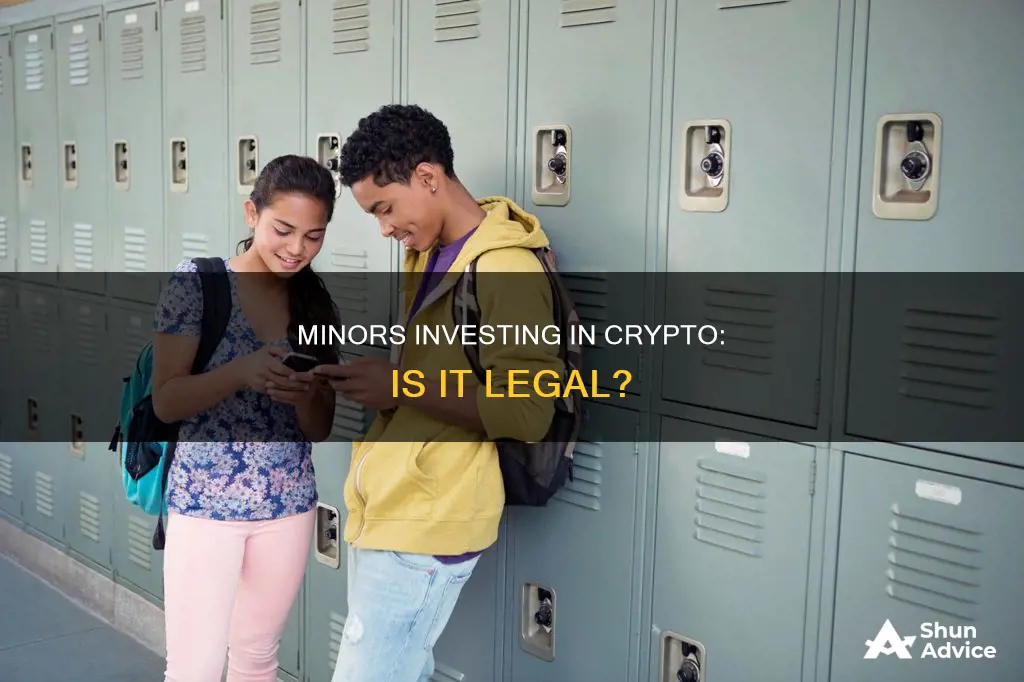
While there are no laws prohibiting minors from investing in cryptocurrencies, many crypto exchanges require users to be at least 18 years old. This creates a predicament for minors eager to invest in crypto assets like Bitcoin and Ethereum. Fortunately, specialised custodial crypto services cater to this younger audience by allowing parents to open and manage accounts on their child's behalf. These accounts give parents control over the account until the child reaches adulthood and can also be used to give cryptocurrency as a gift.
| Characteristics | Values |
|---|---|
| Are there laws preventing minors from investing in cryptocurrencies? | There are no laws forbidding minors from investing in cryptocurrencies. |
| Are there regulations preventing minors from investing in cryptocurrencies? | There are no regulations preventing minors from investing in cryptocurrencies, though they face barriers to entry. |
| Are there age requirements for crypto platforms? | Most crypto platforms require users to be at least 18 years old. |
| Are there alternative ways for minors to invest in cryptocurrencies? | Minors can invest in cryptocurrencies through custodial accounts, joint accounts, or apps that allow them to earn crypto. |
| Are there risks associated with crypto investing? | Crypto investing is high-risk and mostly unregulated, so minors should not invest more than they or their parents are willing to lose. |
What You'll Learn

Minors can invest in crypto with their parents' help
While there are no laws prohibiting minors from investing in cryptocurrencies, many crypto exchanges require users to be at least 18 years old. This creates a barrier for minors who want to invest in crypto. However, there are ways for minors to get involved in the crypto market with the help of their parents. Here are some options:
Custodial Accounts
A custodial account is an adult-managed investment account that allows a parent or guardian to open an account on behalf of their child. The assets in the account are legally owned by the child, but the parent or guardian has control over the account until the child reaches the age of majority (usually 18). Some popular platforms that offer custodial accounts for crypto include EarlyBird, UNest, and Step.
Joint Brokerage Accounts
A joint brokerage account is an account co-owned by two people, one of whom must be an adult. This allows a parent to open an account with their minor child, giving them joint ownership of the account. Both owners have an equal say in investment decisions, so if you plan to invest in crypto, you should choose an account that supports the desired coins. A multi-signature cryptocurrency wallet, which requires two or more private keys to sign and send a transaction, may be a good option for joint ownership.
Crypto Gifts
Parents can buy and hold cryptocurrencies themselves and then gift the fiat currency or the crypto directly to their children when they become adults. This method may have tax implications, so it is important to consider the potential tax consequences before choosing this option.
Crypto Wallets
Minors can also get involved in the crypto market by creating a crypto wallet. While registered exchanges and wallet providers typically won't allow minors to sign up for a wallet, there are decentralized options available. These wallets don't have the same age restrictions as centralized exchanges, but they may not offer the same level of security and protection. It's important for minors to carefully research their options and understand the risks involved before choosing a decentralized wallet.
Crypto Payments for Work or Freelancing
Another way for minors to acquire crypto is by finding part-time jobs or freelancing in the IT and crypto fields. These industries often pay well and may even offer payment in the form of cryptocurrency. This can be a great way for minors to get involved in the crypto space and earn crypto without investing their own money.
Crypto Education
While investing in crypto can be risky, it can also be a valuable learning experience for minors. Parents can involve their children in the process of researching and investing in crypto, teaching them about financial literacy, risk management, and how to make sensible investments. This can give minors a head start in understanding the world of crypto and help them make more informed decisions when they are old enough to invest on their own.
The Ultimate Guide to Investing in Dogecoin
You may want to see also

Crypto is a good way to improve a minor's financial literacy
Crypto is a digital currency that can be bought and sold on an encrypted network called the blockchain. It is not issued by any government and has no physical existence. While it can be a risky investment due to its volatile nature and regulatory uncertainty, it can also be a valuable tool for financial education.
There are several ways that crypto can improve a minor's financial literacy:
- Improving financial literacy: Crypto can teach minors about the basics of money management, such as saving and investing. They can learn about the concept of risk and reward by seeing how their investments grow or shrink in value.
- Investing for the future: With a long time horizon for investments, minors who invest in crypto may see substantial growth in value by the time they need to use it for expenses.
- Learning about blockchain technology: Depending on their age, minors can learn about blockchain technology and how it affects various industries. This can give them a better understanding of the financial ecosystem and the transparency and trustworthiness of money transfers.
- Engaging in the financial system: Crypto is often seen as more engaging and innovative than traditional investments, such as the stock market. By investing in crypto, minors can become actively involved in their financial decisions and experience real-world outcomes.
- Access to the world of trading: Investing in crypto gives minors access to the world of trading, which was previously only open to Wall Street investors. This can help to democratize and demystify the world of wealth.
It is important to note that investing in crypto carries risks and minors should only invest what they or their parents are willing to lose. However, with proper guidance and education, crypto can be a valuable tool for improving a minor's financial literacy and preparing them for the future.
The Best Stocks to Invest in Bitcoin
You may want to see also

Crypto exchange-traded funds for teens
Crypto ETFs are funds that trade just like stocks. They were approved by the US Securities and Exchange Commission (SEC) in 2024. Crypto ETFs are a much easier way to buy crypto than through an exchange, as you don't have to worry about hot wallets, cold wallets, and the security of the trading platforms. ETFs are also strongly regulated, and your investments are protected by the Securities Investor Protection Corporation (SIPC) if the platform goes bankrupt.
Prominent Crypto ETFs
- Grayscale Bitcoin Trust ETF (GBTC) – the first and largest Bitcoin ETF
- IShares Bitcoin Trust (IBIT)
- Bitwise Bitcoin ETF (BITB)
- ARK 21Shares Bitcoin ETF (ARKB)
How to Get Started
If you are a teenager interested in investing in crypto ETFs, you will need an adult (typically a parent) to establish a custodial account for you. You generally won't gain control over the assets until you are over 18 years old.
Risks and Benefits
It is important to remember that crypto investing is high-risk and mostly unregulated, so teens should not invest more than they or their parents are willing to lose. Crypto is a volatile asset class, and there is also regulatory uncertainty, as some cryptocurrencies could be banned or restricted by governments. However, crypto ETFs can be a good way to reduce the risks of holding crypto directly, as they are regulated and protected by the SIPC.
Salt Coin: A Smart Investment Decision?
You may want to see also

Crypto is a volatile asset
While minors can legally invest in cryptocurrencies, they are extremely volatile assets and are therefore high-risk. Volatility is a measure of how much the price of an asset has moved up or down over time. Generally, the more volatile an asset is, the riskier it is considered to be as an investment. As a new asset class, crypto is widely considered to be volatile, with the potential for significant upward and downward movements over shorter time periods.
Cryptocurrency is a decentralised currency, meaning it is not issued by a government's central bank. It is also not backed by anything tangible, like gold or diamonds. Instead, its value is based on speculation and how much people are willing to trade for it. This makes its price incredibly sensitive to even slight changes in investors' expectations or perceptions.
For example, the value of Bitcoin was $68,000 in November 2021. By September 2022, its value had declined to about $20,000—a 70% loss in value. In one day, Bitcoin's value dropped by 30%. This volatility means that investors could lose some or all of their investment, and they should expect to see 50% or greater drops in value at times.
Factors that can increase volatility include positive or negative news coverage, earnings reports, and unusually high spikes in trading volume. Very low volume, as seen with smaller cryptocurrencies, also usually corresponds with high volatility.
Despite the risks, many people believe that crypto is the future of finance and that it should be included in basic financial education for preteens and teenagers. If minors want to invest in crypto, it is recommended that they do so through a custodial account or an approved crypto app, with the help of a parent or guardian.
Bitcoin Cash: Invest Now or Later?
You may want to see also

Crypto accounts for minors — top picks
Yes, minors can invest in cryptocurrencies. While there are no laws prohibiting minors from investing in cryptocurrencies, many crypto exchanges require users to be at least 18 years old. Therefore, minors who want to invest in cryptocurrencies will likely need the help of a parent or guardian.
Crypto Accounts for Minors
- Joint Brokerage Account with Crypto: A joint brokerage account is a type of account that is co-owned by two people, typically a parent and their minor child. Both owners have equal rights and decision-making power over the investments made in the account. This can be a good option for parents who want to give their children some autonomy in their investment choices while still retaining some control.
- Custodial Account with Crypto: A custodial account is an adult-managed investment account opened by a parent or guardian on behalf of a minor. The assets in the account legally belong to the minor, but the parent or guardian has control over the account until the child reaches the age of majority. This can be a good option for parents who want to give their children a head start in investing but are not yet comfortable with them making their own investment decisions.
- Crypto Wallet: A crypto wallet is a digital wallet that stores the public and private keys needed to access and transact with cryptocurrencies. While there is no age limit for crypto wallets, minors will likely need assistance from a parent or guardian to set one up. Crypto wallets can be hot (online) or cold (offline), with cold wallets being considered more secure but less convenient.
- Decentralized Exchange: Decentralized exchanges (DEXs) are crypto-asset trading applications that use smart contracts instead of a centralized trading system. DEXs do not store user funds or control transactions, and there is typically no user verification procedure. This can be a risky option for minors due to the lack of regulatory oversight, but it may be one of the few ways for minors to access crypto exchanges independently.
Other Options for Minors to Obtain Crypto
In addition to the above accounts, there are other ways for minors to obtain cryptocurrencies:
- Peer-to-Peer Exchanges: P2P exchanges allow crypto investors to transact directly with each other without a centralized third party. P2P platforms typically have less stringent identity verification requirements, making them more accessible to minors.
- Bitcoin ATMs: There are over 14,000 Bitcoin ATMs worldwide that allow users to buy or sell Bitcoin using cash. Some ATMs also accept credit and debit cards. However, using a Bitcoin ATM may be a risky option for minors, as there is no way to recover funds if something goes wrong.
- Freelancing or Part-Time Work: Minors can find part-time jobs or freelancing opportunities in the IT or crypto industries that pay in cryptocurrency. This can be a good way for minors to earn crypto while also gaining valuable work experience.
- Crypto Gift Cards: Minors can receive cryptocurrency gift cards from their parents or other adults. These gift cards can be used to store and send cryptocurrencies and can be a safer alternative to purchasing crypto directly on an exchange.
Considerations for Parents
Before opening a crypto account for their child, parents should carefully consider the risks involved. Cryptocurrencies are highly volatile and unregulated, and there is no safety net if something goes wrong. It is essential to educate both yourself and your child about how cryptocurrencies work and the potential risks and rewards. Additionally, parents should consider the following:
- Age of the Child: While there is no minimum age to own cryptocurrency, most major exchanges require users to be at least 18 years old. This can make it challenging for minors to open and manage their own accounts.
- Custodial Accounts: Custodial accounts can be a safe and convenient way for parents to manage crypto investments on behalf of their children. However, it is important to understand the rules and regulations surrounding these accounts, as well as the potential tax implications.
- Educational Opportunities: Investing in cryptocurrencies can be an opportunity for parents to educate their children about financial literacy, risk management, and blockchain technology. However, it is crucial to ensure that children understand the risks involved and do not invest more than they can afford to lose.
Final Thoughts
While there are no legal restrictions on minors investing in cryptocurrencies, it is essential to approach this topic with caution. Cryptocurrencies are highly speculative and unregulated, making them a risky investment for anyone, especially minors. Parents who are considering investing in cryptocurrencies on behalf of their children should carefully weigh the risks and benefits and seek financial advice if necessary.
Augur Cryptocurrency: A Guide to Investing and Trading
You may want to see also
Frequently asked questions
There is no minimum age requirement to own cryptocurrency. However, most major crypto platforms, including traditional brokerage firms, won't let a minor buy crypto without parental assistance.
While minors aren't outlawed from having a crypto wallet, registered exchanges and other wallet providers typically won't allow a minor to sign up for one.
Yes, you can open a crypto account for your child if it's a custodial account, joint account, or another type of account that allows the child to earn crypto without directly buying it.
The safest way for minors to buy crypto is with the participation of an adult. This can be done through a custodial account, joint account, or by receiving crypto as a gift.
Crypto is a risky and volatile investment for anyone, especially minors. There is also a lack of strict crypto regulations, and the potential for fraud and hacks is higher than with most other assets.







